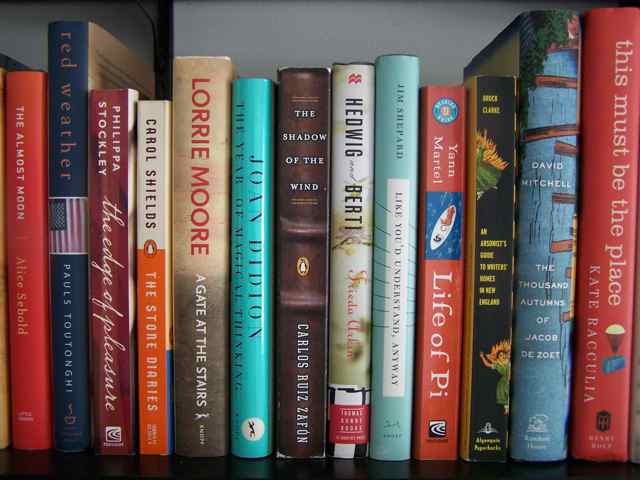 The appealing cover, the title, and the tag line (“A hymn to fine literature”) made me check out A Novel Bookstore by Laurence Cossé (a woman, BTW), translated from the French by Alison Anderson. It is one of those quirky, clever books that maybe some readers will want to throw across the room in frustration at how much information the author holds back, but the story was intriguing in a bookish way. Although it opens with a series of crimes, A Novel Bookstore is only crime fiction in the way that Kate Atkinson‘s Jackson Brodie novels are, or Alexander McCall Smith’s Sunday Philosophy Club series is. The mystery element is a plot device, not the main focus.
The appealing cover, the title, and the tag line (“A hymn to fine literature”) made me check out A Novel Bookstore by Laurence Cossé (a woman, BTW), translated from the French by Alison Anderson. It is one of those quirky, clever books that maybe some readers will want to throw across the room in frustration at how much information the author holds back, but the story was intriguing in a bookish way. Although it opens with a series of crimes, A Novel Bookstore is only crime fiction in the way that Kate Atkinson‘s Jackson Brodie novels are, or Alexander McCall Smith’s Sunday Philosophy Club series is. The mystery element is a plot device, not the main focus.
Francesca, a wealthy, sad woman, and Ivan, a well-read bookstore manager, plan to open an independent bookstore, The Good Novel, that will only sell “good” novels. The books will be selected by a committee of literary novelists, so secret and anonymous that the members don’t even know who else is on the committee. Polite readers of literature, Francesca and Ivan hadn’t imagined that their idea for a store selling only fiction that is worth reading would generate bitter, violent animosity, but escalating attacks on each committee member in turn result in a police investigation.
While slowly developing the relationships between the neurotically private main characters, the author packs A Novel Bookstore full of passionate ideas about literature — raising questions such as: what makes a novel great? Who decides literary quality and how? Could a store such as The Good Novel thrive today?, etc.
Lastly, would A Novel Bookstore be sold in the mythical The Good Novel store, if it really existed? Although I wasn’t familiar with many of the French authors mentioned and did wonder about the translation of a few odd phrases, I think A Novel Bookstore would have gained a coveted spot on the shelf for new releases in The Good Novel bookstore, at least for a season or two.
Other opinions about A Novel Bookstore (mostly good):
Bookeywookey
A Common Reader
The Hungry Reader
The Washington Post — Elizabeth Hand

Suggestions from a Massachusetts Librarian